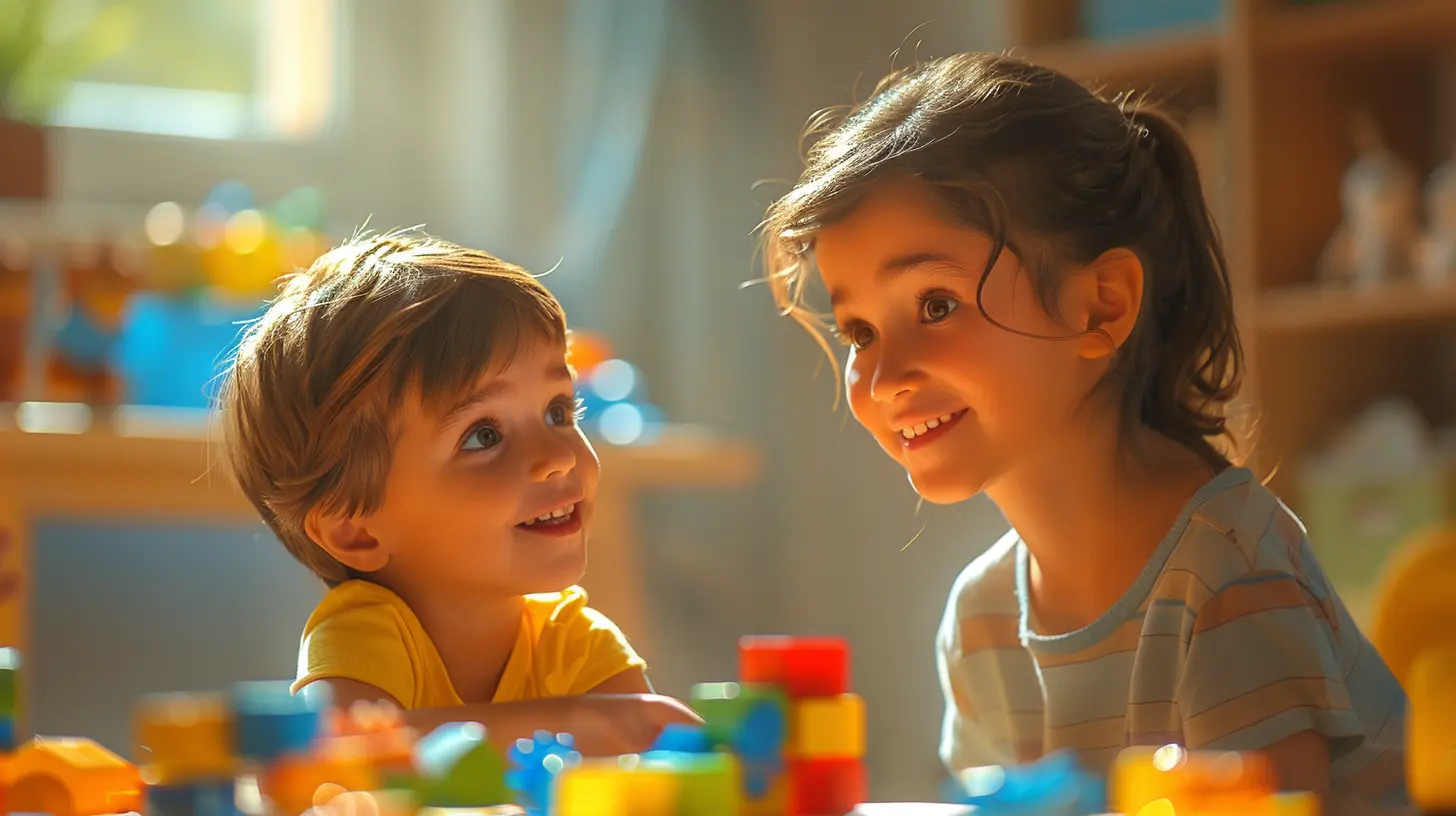Boosting Your Preschooler's Language Development Through Everyday Conversation
9 January 2025
Parenthood is like navigating uncharted waters—not only are you working to keep your tiny humans alive, but you’re also shaping their little minds. One of the most incredible things you can do for your preschooler is to help them develop strong language skills. And no, you don’t need a classroom, flashcards, or a fancy curriculum. All you need is you, your voice, and a sprinkle of everyday magic.
But how exactly do you go about it? Let me show you how everyday conversations—yes, even those chats about snacks or why socks can’t be worn inside out—can be powerful tools for boosting your preschooler’s language development.

Why Everyday Conversation Matters
Here’s the thing: language development doesn’t just happen in one big “aha!” moment. It’s more like planting a garden. Every word you speak is a seed, and every interaction is like watering that seed. Over time, with patience and nurturing, you’ll see your little sprout blossom into a chatterbox with words and expressions that light up the room.Everyday conversations are the secret sauce. They’re opportunities for learning new words, understanding sentence structure, and even flexing social skills. Plus, they’re free, easy, and happen naturally throughout the day.
Now, let’s break it down into actionable steps so you can turn those toddler ramblings into golden opportunities for learning. 
1. Narrate Your Day
Ever feel like you’re talking to yourself while unloading the dishwasher or folding laundry? Guess what? That’s perfect! Preschoolers soak up language like a sponge, so narrating your day is a great way to expose them to words they might not otherwise hear._For example_: Instead of just silently making lunch, say, “Mommy is spreading peanut butter on the bread. Oh, now we’re going to add some jelly.” It’s like giving your little one a front-row seat to a movie called “Life in Words.”
But wait—it doesn’t have to be fancy. You don’t need to use SAT-level vocabulary. Just keep it conversational. Think of it as a play-by-play commentary, like a sports announcer but with Cheerios instead of touchdowns. 
2. Ask Open-Ended Questions
Want to keep your preschooler engaged? Swap out those yes-or-no questions for open-ended ones. Instead of asking, “Did you like your snack?” try, “What was your favorite part of your snack today?”Open-ended questions encourage your child to use more words and expand their thoughts. It’s like giving them a blank canvas instead of a coloring book. Plus, you might be surprised by their answers—kids have a way of turning even the simplest question into a mini TED Talk. 
3. Be a Great Listener
This one’s a biggie. When your preschooler is talking, resist the urge to finish their sentences or correct their grammar right away. Sure, it might take them three minutes to describe how their toy dinosaur “roared super loud and scared the baby doll,” but let them work through it.Being an attentive listener signals to them that what they’re saying is important. And when they feel heard, they’re more likely to keep talking—which means more opportunities to practice their language skills.
Think of it like planting flowers: if you interrupt them by “weeding” too early, you might accidentally pluck their budding confidence.
4. Turn Mundane Moments Into Teachings
Grocery shopping? Bath time? Car rides? These aren’t just errands or routines—they’re prime language development real estate.At the grocery store, talk about the colors of fruits, count apples, or discuss the difference between smooth and bumpy textures. During bath time, chat about how water feels, sing silly songs, or ask them to name their bath toys.
Even in the car, point out sights like fluffy clouds or honking cars and encourage them to chime in with what they see. Everyday moments are the unsung heroes of language development!
5. Embrace Repetition (Yes, Even If It Drives You Bonkers)
Let’s be real—preschoolers LOVE repetition. Have you sung “The Wheels on the Bus” so many times that it’s practically your personal anthem? Guess what? That’s a good thing!Repetition helps kids learn new words and phrases. The more they hear something, the more likely they are to remember it. So, channel your inner DJ and hit replay, even if you’re secretly counting down the days until they outgrow their obsession with that one bedtime story.
6. Use Big Words (But Keep It Fun!)
Here’s a little hack: don’t shy away from using “big” words just because your preschooler is, well, preschool-aged. Instead, sprinkle them into your conversations like glitter on a craft project.Say, “Look at that enormous truck!” instead of just “big truck.” Or describe their drawing as “colorful and vibrant.” The trick is to use these words naturally and explain them on the spot if your child gives you that adorable blank stare.
Think of it like building their mental dictionary one word at a time. Who knows? They might even surprise Grandma by calling her spaghetti “scrumptious” one day.
7. Read Books Together (And Talk About Them)
Okay, I know this one isn’t exactly “everyday conversation,” but hear me out. Books are like conversation starters in disguise.When you’re reading with your preschooler, stop and ask questions. “Why do you think the bunny is running so fast?” “What do you think will happen next?” “How does the dinosaur feel in this picture?”
Books offer endless opportunities to introduce new vocabulary, explore emotions, and spark curiosity—all of which contribute to language development.
8. Play Pretend
Who doesn’t love a little make-believe? Whether your preschooler is pretending to be a chef, a teacher, or a superhero, these role-playing games are gold mines for language practice.When you join in, don’t just play along—stretch their imagination with new words and scenarios. If they’re a chef whipping up an imaginary dinner, ask, “What’s on the menu?” or “Can you pass me the invisible salt shaker?”
Pretend play is like the theater of language development—it’s where creativity meets communication.
9. Sing, Rhyme, and Be Silly
Preschoolers don’t care if you can’t carry a tune (I mean, they practically think you’re Beyoncé anyway). Singing and rhyming aren’t just fun—they’re powerful tools for language learning.Songs like “Old MacDonald” or rhyming games introduce rhythm, speech patterns, and new words without your child even realizing they’re learning. And if you make up your own silly songs? Bonus points for creativity!
Pro tip: Throw in some goofy gestures or dance moves. The sillier, the better.
10. Celebrate Their Progress
Lastly, don’t forget to cheer them on! When your preschooler uses a new word or successfully strings together a longer sentence, make a big deal out of it. Celebrate their tiny victories—it’s like giving them a high-five for their brain.Words of encouragement like “Wow, you used such a big word!” or “I love how you told me that story!” can go a long way in building their confidence. And a confident kiddo is one who will keep chatting, learning, and growing.
Final Thoughts
Boosting your preschooler’s language development doesn’t require special tools or hours of structured teaching. It’s as simple as talking, listening, and connecting with them throughout your day. Think of these everyday conversations as breadcrumbs leading them toward a lifetime of communication skills.And hey, don’t stress about getting it perfect—parenting isn’t a performance. It’s a journey. So, laugh at the mispronunciations, cherish the funny phrases, and know that every word you share is a gift that’ll help them bloom in their own time.
Now, go ahead and start those chats—you’ve got this!
all images in this post were generated using AI tools
Category:
Parenting PreschoolersAuthor:

Max Shaffer
Discussion
rate this article
14 comments
Miriam Hunter
This article offers valuable insights into enhancing preschool language skills through daily conversations. Simple strategies can foster communication, encourage vocabulary growth, and strengthen parent-child bonds. A must-read for all parents aiming to support their child's development!
March 24, 2025 at 4:51 PM

Max Shaffer
Thank you for your kind words! I'm glad you found the strategies helpful for supporting language development.
Lana Weber
Engaging in daily conversations is a wonderful way to nurture your child's language skills!
February 17, 2025 at 5:52 PM

Max Shaffer
Thank you! Daily conversations truly play a vital role in enhancing language development.
Isabella Weber
Every conversation counts! Engage your preschooler with open-ended questions and rich vocabulary to enhance their language skills daily.
January 31, 2025 at 5:28 AM

Max Shaffer
Thank you for highlighting the importance of open-ended questions! Engaging in meaningful conversations is indeed a vital way to boost preschoolers' language development.
Tempra Morgan
Great tips! Engaging in everyday conversations really makes a difference. It’s amazing how simple chats can boost our little ones’ language skills. Thanks for sharing!
January 25, 2025 at 5:04 AM

Max Shaffer
Thank you for your kind words! I'm glad you found the tips helpful. Engaging conversations truly can make a big difference in language development!
Jillian Mitchell
Love this helpful advice!
January 19, 2025 at 3:44 PM

Max Shaffer
Thank you! I'm glad you found it helpful!
Anika Flores
In the dance of daily words, let laughter flow, Each simple chat a seed we sow. Through stories shared and questions bright, We paint their world with colors of light. In every dialogue, a treasure found, Nurturing minds in joy profound.
January 16, 2025 at 3:54 AM

Max Shaffer
Thank you for beautifully capturing the essence of daily conversations! Every exchange truly enriches our children's language and creativity.
Mateo Evans
Engage in dialogue; nurture their language skills!
January 14, 2025 at 5:40 AM

Max Shaffer
Absolutely! Engaging in meaningful dialogue is key to nurturing language skills in preschoolers. It fosters their ability to express thoughts and enhances vocabulary. Thank you for your insights!
Gabrielle Jones
Engaging in daily conversations with your preschooler is essential; it not only enriches their vocabulary but also fosters confidence and critical thinking. Make every chat count!
January 13, 2025 at 5:58 AM

Max Shaffer
Thank you for highlighting the importance of daily conversations! Engaging with preschoolers truly lays the foundation for their language skills and overall development. Every interaction matters!
Halle Hensley
This article is a treasure trove of insights! I'm curious about specific conversational strategies that can really make a difference. How can we balance structured interactions with spontaneous conversations to maximize language growth in our preschoolers?
January 11, 2025 at 3:35 PM

Max Shaffer
Thank you for your enthusiasm! Balancing structured interactions with spontaneous conversations involves using guided questions during planned activities while also seizing everyday moments to engage in natural dialogue. This dual approach fosters language growth by providing both support and freedom for children to express themselves.
Gunnar Graham
Forget fancy toys! Just chat it up with your little chatterbox. Turns out, the secret to a mini Shakespeare isn’t Shakespeare at all—it’s you babbling about broccoli while they giggle! Who knew broccoli could be the key to linguistic brilliance?
January 11, 2025 at 6:04 AM

Max Shaffer
Absolutely! Engaging in everyday conversations, even about broccoli, sparks creativity and language skills in young children. Your words truly matter!
Quillan McFarland
This article offers invaluable insights into enhancing preschool language skills. Simple, everyday conversations truly make a difference in fostering communication and cognitive growth. Thank you for sharing!
January 10, 2025 at 5:38 PM

Max Shaffer
Thank you for your kind words! I'm glad you found the article helpful in recognizing the importance of everyday conversations for language development.
Jett McKellar
Engaging in daily conversations with your preschooler significantly enhances their language skills, fostering vocabulary expansion and improving their overall communication abilities. Simple interactions matter.
January 10, 2025 at 5:16 AM

Max Shaffer
Absolutely! Daily conversations are vital for language development in preschoolers, and even simple interactions can make a big difference. Thank you for highlighting this important aspect!
Bellamy Sanders
Chat away! Every word counts in your little one's journey!
January 9, 2025 at 4:13 PM

Max Shaffer
Thank you! Every conversation truly is a step forward in their language journey!
Selene Matthews
Engaging in daily conversations with your preschooler is essential for their language development. Make it a habit to ask open-ended questions and encourage them to express their thoughts. Simple interactions can spark curiosity and foster a rich vocabulary. Let's nurture their voice!
January 9, 2025 at 3:55 AM

Max Shaffer
Thank you for highlighting the importance of daily conversations! Engaging with preschoolers using open-ended questions truly enriches their vocabulary and nurtures their curiosity. Let's keep fostering those essential communication skills!
MORE POSTS

Redefining Success: How to Focus on Intentional Parenting

Car Safety at Home: How to Childproof Your Garage

Keeping Your Baby Safe on Multi-Story Homes

Why Curiosity is a Key Element of School Readiness

Packing a Healthy Lunch: Nutrition Tips for School-Ready Kids

How to Make Science Fun for Your Kids

Balancing Attention Between Siblings Without Favoring Any Child

Ways to Cultivate Gratitude During Family Vacations and Trips

How to Build a Family Schedule That Works with Your Career